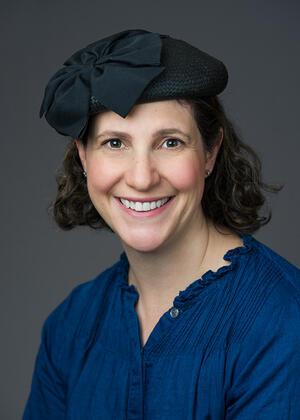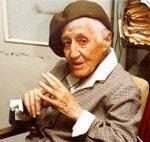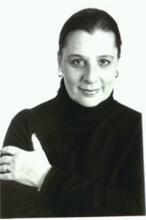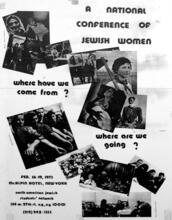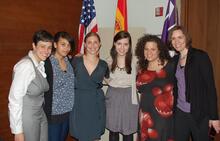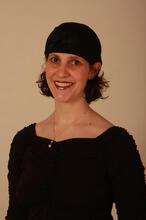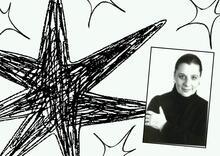Sara Hurwitz
Sara Hurwitz grew up as a quiet, understated young woman in Johannesburg, South Africa. Inspired by Nelson Mandela and the bravery of her parents, who moved out of apartheid South Africa to America, Hurwitz began a journey towards not only deepening a connection to Orthodox Judaism but also opening up a path for other Orthodox women to serve the community. Her tenacity and model of putting one foot in front of the other has helped her traverse controversy and face push-back from some sectors of the Orthodox community. In 2009, she became the first Orthodox woman to be publicly ordained and serve in an Orthodox synagogue. Shortly thereafter, she helped found Yeshivat Maharat, a rabbinical school that trains and ordains other women to serve the Jewish community.
Introduction
“This is the day which the Lord has made; We will rejoice and be glad in it.” Three of the four guest speakers at the Rabbinic ordinationsemikhah conferral ceremony of Rabba Sara Hurwitz, March 22, 2009, uttered these joyous words of the Psalmist [118:24]. An overwhelming sense that history was being made pervaded the first public ordination of an Orthodox woman: this was a beginning, and Sara Hurwitz would be the flag bearer. It did not matter that she had passed her qualifying exams in rabbinic texts several months earlier. Nor did it matter that the Orthodox establishment had thrown down the gauntlet, nor even that several other Orthodox women had already been secretly and privately ordained. What mattered was that Rabbi Avi Weiss, Rabba Sara’s mentor and professional partner, was prepared to declare to the world that this bold new idea of Orthodox women rabbis was legitimate, and this gentle, soft-spoken young woman was prepared to step into the limelight and publicly carry the controversial title on her slight shoulders.
And she did, and now not one but several institutions ordain Orthodox women. Dozens of women around the world, most of them from Yeshivat Maharat, the rabbinical school Rabba Sara co-created, fulfill the duties and carry the multiple titles of a rabbi. But how did Hurwitz come to be the central force of a movement, an institution, and a firestorm that have truly changed traditional Judaism forever?
Family and Education
Sara Hurwitz was born in Johannesburg, South Africa, on March 15, 1977. Disheartened with apartheid politics, her parents, Mervyn and Melanie Hurwitz, moved Sara and her older sister, Erica, to Boca Raton, Florida, in 1989. Nelson Mandela was their hero, and he became Sara’s hero and a leadership model for her life: “When Nelson Mandela walked out of prison after suffering for his entire life in the face of a system that treated him as a second-class citizen, he could have rallied his followers to launch a civil war. Instead, he walked out with his head held high, one foot in front of the other, and channeled his energy towards creating unity, growth and peace” (Hurwitz, interview with the author, 2021). This well describes Hurwitz’s posture in the face of the controversy she later endured.
In Boca Raton, Hurwitz became active in her synagogue and in the community’s youth groups. There were no Jewish middle or high schools in Boca Raton in those years. Her parents gave her the choice of two hours of travel daily to a Jewish school in Miami or attendance at the local public school. To this day, she feels ambivalent about missing years of Jewish high school education, but she also acknowledges that the secular school contributed to who she is today.
In Boca Raton, Hurwitz’s Jewish education during the important high school years came largely through her involvement in synagogue life. Although she was not close to her rabbi, she loved being in shul. Prayer, study, and youth groups were the centers of her life. As she had no model of an Orthodox female rabbi, she harbored no such fantasies. Yet as a teenager, she already knew that she wanted to teach Torah she-bi-khetav: Lit. "the written Torah." The Bible; the Pentateuch; Tanakh (the Pentateuch, Prophets and Hagiographia)Torah and Jewish texts to adults and engage in Jewish community building.
Hurwitz did not take this path immediately. After graduating from high school in 1994, she spent a year in Israel at Midreshet Lindenbaum, a women’s learning institution. She returned in 1995 to enter Barnard College, where she majored in Psychology. Still, she was always drawn to Jewish engagement work, and in college she joined a group of young women who created Lights in Action, a student-run organization that sought to connect other Jewish students to Judaism. Their work involved organizing conferences and producing creative teaching materials, talents upon which she would draw in later years. After graduating from Barnard in 1999, she continued her work with Lights in Action. Altogether, she served as its director for six years.
In 2000, Hurwitz also entered the Drisha Institute Scholars Circle Program, a full-time, three-year learning program created by Rabbi David Silber, a pioneer in women’s higher Jewish education. She was now firmly planted on a path of studying and teaching texts, primarily rabbinic texts that had been closed to women for centuries. Among her influential teachers was Devorah Zlochower, an eminent Jewish scholar who later became her colleague at Yeshivat Maharat.
Teaching, Lecturing, and Writing
While at Drisha, Hurwitz began to teach and lecture in synagogues around the country under the auspices of various programs, such as the Jewish Orthodox Feminist Alliance’s (JOFA) Shabbat Telamdeini program, CLAL (the National Jewish Center for Leadership and Learning), and Jewish Community Centers. Thus began her “have lecture, will travel” lifestyle, which stood her in good stead in later fundraising activities. Also while in the Drisha Scholars Circle Program, Hurwitz attempted to create a professional development track that would enable graduates to find meaningful employment in the organized Jewish community.
After graduating from Drisha, Hurwitz served as researcher/writer from 2003 to 2006 for JOFA’s Gender and Orthodoxy Project. Working under the direction of Dr. Chaya Gorsetmann, she helped create “Bereishit: A New Beginning,” a gender-sensitive curriculum for teaching biblical texts in Orthodox day schools. Step by step, she was laying the groundwork for that fateful day in March 2009 and for her current leadership and teaching roles.
A turning point came in 2003, when Hurwitz began her association with Rabbi Avi Weiss of the Hebrew Institute of Riverdale [HIR], where she remains a member of the rabbinic team. Rabbi Weiss became her longtime generous and steadfast mentor. Under his tutelage, she served as a congregational intern at HIR for seven years, fulfilling all of a rabbi’s functions except for responsibilities in the Orthodox minyan, the prayer quorum of ten men. Her multiple tasks included teaching texts, speaking from the pulpit, officiating at life-cycle events, lending a helping hand to the pioneering women’s prayer group that met in the synagogue, answering congregants’ The legal corpus of Jewish laws and observances as prescribed in the Torah and interpreted by rabbinic authorities, beginning with those of the Mishnah and Talmud.halakhic questions, and, with her training in psychology, counseling congregants during trying times. Yet, as a woman, she could not carry a title other than intern, nor be included in the congregation's rabbinic staff, while the congregation's male interns carried the title of assistant rabbi and often moved on to their own senior rabbinic positions after a few years of service.
Pathbreaking Ordination
In conversation with Hurwitz, Rabbi Weiss opened the door to rabbinic advancement providing she would take on the study of texts required of Orthodox rabbis in training. Back to the books she went, studying under Rabbi Weiss for eight years while simultaneously serving the HIR congregation. After she gained knowledge to render a halakhic (legal) opinion and the ability to apply traditional sources to contemporary situations, it was time to confer a formal credential upon her. In 2008, Hurwitz completed her oral and written exams, and Rabbi Weiss and two colleagues, including Rabbi Daniel Sperber, agreed to ordain her in the near future. The next step was the very public ceremony at HIR in March 2009. (By this time, the third rabbi who had participated in her oral examinations had buckled under criticism and had withdrawn from the scene.) Weiss and Sperber gave her the title of MaHaRaT, the acronym for Manhiga Hilchatit Ruchanit Toranit, i.e., a leader possessing halakhic, spiritual, and Torah-based values.
Hurwitz’s pathbreaking role did not stop there. The day after her ordination, she was interviewed by a minor Jewish publication. When asked what was next in store for her, she blurted out her desire to create an institution for other women who harbored dreams of rabbinic service. Part of her ad hoc response in the interview came from the elation of the ordination ceremony; many young women had approached her to ask how they could follow the same path. To an outsider, it looked almost as if the idea of creating a rabbinic school for women resulted from the serendipity of the previous day’s joyous ceremony and the interviewer’s curious question. After all, neither Weiss nor Hurwitz had mentioned a rabbinic school in their respective speeches at the conferral.
Yeshivat Maharat
Yet nothing could be further from the truth. In fact, Hurwitz and Weiss had privately been discussing a rabbinic school for women for several years. With the publicity resulting from the public ceremony, it became clear to mentee and mentor that the controversy would not die down, even if they stepped back. His institution-building skills and political fearlessness combined with her long-felt passion to teach adults and desire to create for others opportunities she had been given were strong predictors of success. As Hurwitz explained, “At the conferral ceremony itself, women approached asking how to study towards the rabbinate. It was clear that there was a need for a formal institution to train women to be spiritual leaders. Because of my own experience, sense of fulfillment and excitement, I understood the desire and drive of others to serve in this capacity. I knew that with God’s help, and the help of the many people who also supported the Orthodox ordination of women, my dream could be dreamed, and the dream realized by others” (interview with the author, 2021).
When Hurwitz asked Rabbi Weiss a few days later how they would go about creating such an institution, he answered simply, “Let’s announce it.” So they did. Dozens of applications flowed in from around the world and they carefully made the selections. The vision was becoming a reality. Their longstanding partnership explains why Yeshivat Maharat opened with breathtaking speed just a few months later, in September 2009, with three students, two employees, and a $100,000 budget. The pioneering institution to ordain Orthodox women, Maharat was also a pioneer in online teaching long before Covid, enabling students from around the world to enroll in the fledgling program. By 2021, Yeshivat Maharat had ordained 49 Orthodox women rabbis, had a strong lay board and growing communal support, and was on secure financial footing. Its annual graduation ceremonies are creative and joyous events, echoes of March 2009.
Hurwitz, Weiss, and their new school did face hurdles along the way, not only public attacks but also finding acceptance and jobs for graduates. Initially, few Orthodox synagogues were prepared to run the gauntlet by hiring Maharats, as the early graduates were called. Hurwitz came up with a creative idea. She approached the doyenne of Orthodox women feminist philanthropists, Zelda R. Stern, to underwrite the early graduates’ salaries in order to encourage synagogues to hire them. Slowly but surely, Maharats were placed in institutions as full members of the professional clergy team, even paid on par with male colleagues, a stipulation of Stern’s gift. Yeshivat Maharat graduates with various titles of Maharat, Rabba, Rabbanit, and Rabbi also serve in clergy roles in hospitals, schools, and Jewish organizations in the United States and around the world.
Rabba and Family Woman
In 2010, another significant change occurred. After considerable deliberation, and knowing the potential consequences, Rabbi Weiss changed Sara Hurwitz’s title from Maharat to Rabba, a convention that had been adopted by female rabbis of the liberal denominations in Israel. Needless to say, this brought fresh controversy, including from some of Rabbi Weiss’s faithful supporters. Neither Weiss nor Hurwitz retreated, but because the title Rabba is still controversial within Orthodoxy, Yeshivat Maharat now bestows the credential of ordination but leaves to the graduate and her employing institution the choice of clergy title.
In 2001, while still studying at Drisha, Hurwitz married lawyer Joshua Abraham, whom she often credits with her successes. They have four sons, twins Yonah and Zacharya and their younger brothers Davidi and Natan. Like all other working mothers, Hurwitz attests to the tensions and crises that arise from the dual roles, but she feels blessed. “I take great pride in being a mom, and try to be as present as possible for them. I don't think I always succeed at doing both well--parenting and public leadership--but I certainly try to laugh with my kids whenever possible. When each of my kids was born, I tended to schlepp them everywhere, even the twins, as I nursed exclusively. By the time Natan came around, taking him everywhere included quite a bit of travel. He flew with me to speaking engagements and fundraising trips alike, some of which were very fruitful!” (interview with the author, 2021). She carves out special time for her boys and makes an effort to keep work and family priorities in balance. After a busy week administering the yeshiva, she can be seen on Friday afternoons on the field watching her sons play baseball.
With all of this, Hurwitz remains understated, modest, kind, goodhearted, and accessible. One senses an abundance of gratitude in her. Someone who survived the criticism, attacks, and pressure she has endured could have turned bitter, but she has remained positive, productive, organized, and cheerful. She now defines her favorite work as mentoring other women: “I find joy in helping other people realize their dreams, in this case, providing a credentialed pathway for women to pursue a rabbinic career that for so many years was not open to them. Now, women in the Orthodox community can use their God-given gifts to become the talented leaders and educators they are meant to be” (interview with the author, 2021).
In this role of mentor, Hurwitz has developed her own set of guidelines, including the following:
- Plan structures well yet maintain flexibility, so as to be poised to adapt to a crisis or a new opportunity.
- Manage up by being humbly proactive, yet seek ways to improve systems without waiting to be asked.
- Don't be shy about asking for help. But first, gather data and information from like-minded institutions and projects, and even competitive ones.
- Take time to periodically stand back to reassess ultimate goals, past achievements, and current processes. In other words, stand far back and deeply contemplate whether all the parts of your work line up with each other.
Rabba Sara Hurwitz is a dynamic leader, a woman who has abundant leadership skills as well as the personality, character and disposition to bring them to fruition.
Selected Awards
2013: Hadassah Foundation Bernice S. Tannenbaum prize
2014: The Myrtle Wreath Award from the Southern New Jersey Region of Hadassah
2016: Trailblazer Award Recipient at UJA Federation of New York
2016: Named as one of The Jewish Week’s 36 Under 36
2016: Named as one of The Forward’s 50 Most Influential Jewish leaders
2016: Named as one of Newsweek’s 50 Most Influential Rabbis
2017: Chosen to be a member of the inaugural class of Wexner Foundation Field Fellows.
Sara Hurwitz, interviews with the author, conducted over several occasions between January and March 2021.

